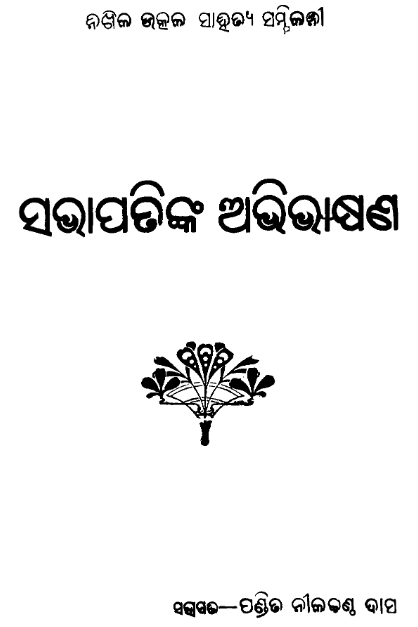Sabhapatinka Abhibhasana, a significant literary work by noted Odia author Nilakantha Das, was published in 1938 and has since occupied an essential place in Odia literature. This book, whose title translates to The Speech of the Speaker, is not merely a literary piece but also a profound commentary on social issues, culture, and the transformative power of language and speech in the Odia community.
The setting of Sabhapatinka Abhibhasana reflects the sociopolitical climate of Odisha during the early 20th century. This period was characterized by a burgeoning sense of regional identity and cultural revival, along with the impact of the Indian independence movement. The narratives surrounding this era often explored themes of nationalism, social reform, and cultural pride. Nilakantha Das, through his insightful observations, captures the essence of this transformative period, creating a dialogue between the traditions of the past and the aspirations of the future.
The book unfolds as a series of speeches delivered by a central character whose purpose is to engage and provoke thought among the audience about various societal issues. Each speech tackles a different facet of community life, weaving together storytelling with rhetorical elegance. The narrative structure allows for a dynamic interplay of ideas, reflective of the oral traditions that are deeply rooted in Odia culture. Das combines humor, pathos, and critical reasoning to challenge societal norms, urging his listeners to reflect on their roles within the community.
One of the most prominent themes in Sabhapatinka Abhibhasana is the empowerment of language as a tool for social change. Nilakantha Das emphasizes the importance of effective communication in advocating for progress and reform. By portraying the speaker as a catalyst for new ideas, the author underscores the significance of dialogue in bringing about societal transformation.
Another critical theme is the exploration of cultural identity. The speeches delve into the rich heritage of Odisha, celebrating its traditions, arts, and folklore while simultaneously interrogating aspects that require reform. This dual approach encourages a sense of pride and responsibility among the readers and listeners to preserve and enrich their cultural landscape.
The work also addresses critical social issues such as education, gender equality, and the need for social awakening. Nilakantha Das uses his character’s speeches to challenge the status quo and encourage the audience to embrace change. This forward-looking vision aligns with the broader narrative of the Indian independence movement, where literature and speeches became essential tools in the fight for social justice.
Nilakantha Das’s literary style in Sabhapatinka Abhibhasana is characterized by its eloquence and clarity. His mastery of the Odia language allows him to craft poetic and persuasive speech that evokes a variety of emotions. The rhythmic quality of his prose reflects the oral traditions of Odisha, making the book accessible and engaging for a diverse audience. Das’s use of metaphors and allegory enhances the depth of his message, allowing readers to connect with complex ideas in a relatable manner.
Books Info
| Books name | Sabhapatinka Abhibhasana / ସଭାପତିଙ୍କ ଅଭିଭାଷଣ |
| Author | Nilakantha Das |
| No Of pages | 60 |
| Publisher | NA |
| Publication | 1938 |
| Printed At | NA |
| Distributor | NA |

